“People think that free is worthless. It seemed to me that I could convince them ”- Yuri Yartsev about Russol school

There has never been so much open knowledge and second access to any information in the world. However, knowledge can still be a terribly expensive product. People pay hundreds of thousands for courses, and sometimes even for mailing lists. But everything is too unpredictable - sometimes acquired knowledge is rubbish, and free knowledge is a jewel, and sometimes vice versa. In petabytes of free, you can dig for years and not find anything there. In these conditions, you do not know who and what to trust.
Yuri Yartsev told me about his experience in creating an online school. He created the Russol startup school. It is special because it’s free. And of course, this leads to distrust of all kinds: both “free is equally useless” and “free cheese is only in a mousetrap”.
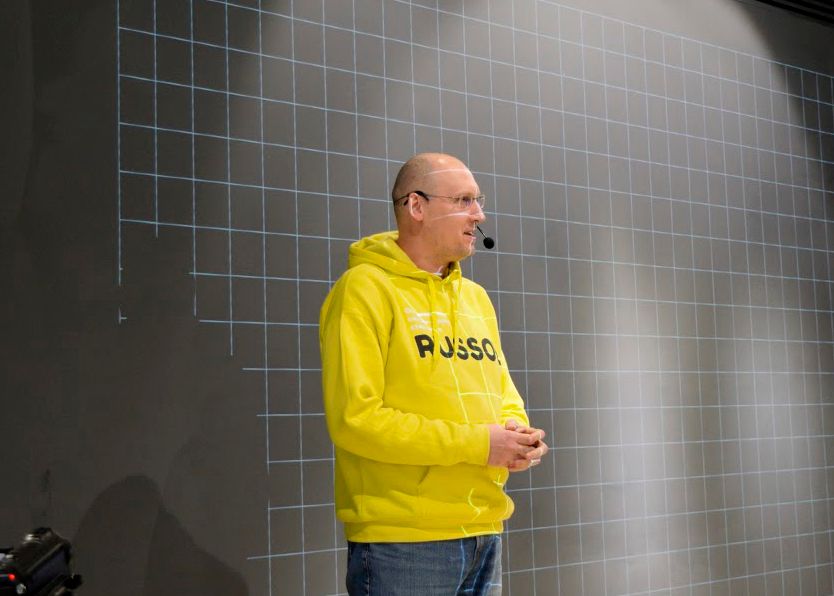
Yuri Yartsev, founder of RUSSOL
Google translator
20 years ago, Yuri Yartsev became an employee of Google, sitting at home. Then it was a completely different company, which was just looking for commercial routes. Yuri liked their system, and he wanted to somehow help. There was a line “need volunteers” on the company's website, he joined and began translating Google’s interfaces into Russian and Ukrainian. After two years of volunteering, Yuri received a letter. The company invited him to do the same, but for money. The company launched new services: AdWords, AdSense. Yuri began to translate them, and as he says, they paid much more for this than the average salary of an IT specialist.
“They had a very old and inconvenient system for translations. For example, they gave the phrase ID for the translation, but in order to find it, you had to upload a table with several thousand phrases. This annoyed me very much - at that time there was a modem connection, precious time was wasted downloading unnecessary ones. Then I made a script in which I simply entered the ID, and he immediately rolled out the necessary phrases. "
Yuri wanted to share the script with other translators. One person was responsible for their coordination. By accident or because of a bug, he put in a copy of the letter the addresses of all translators, and so Yuri met them. “I created a forum, and we started talking there. They shared best practices, coordinated. But four years later, there were so many translators that more and more coordinators appeared, coordinators coordinators, and so on. Then Google hired a large translation agency, and they completely took over the whole process. A few years later they returned to the fact that translators should be their own. But too much time passed, and we all were no longer contacted. The people we worked with have long quit. ”
Community Developer and Organizer
Yuri studied on the one who is engaged in "information management systems." His acquaintance had a real estate agency, and Yuri tried to do something like CRM for him. “People could enter their personal account directly from the site, select a specific apartment, enter their information, and the system automatically generated contracts.”
Now this is everywhere, but in the mid-zero it turned out to be premature. People said, “This is some kind of heresy,” “people don’t use the Internet,” we want the old fashioned way, ““ we have lawyers, we pay them money, they must fill it out manually. ” But Yuri gained experience, plus he remained in touch with dozens of cool translators, and he decided to do this - to make websites and translations.
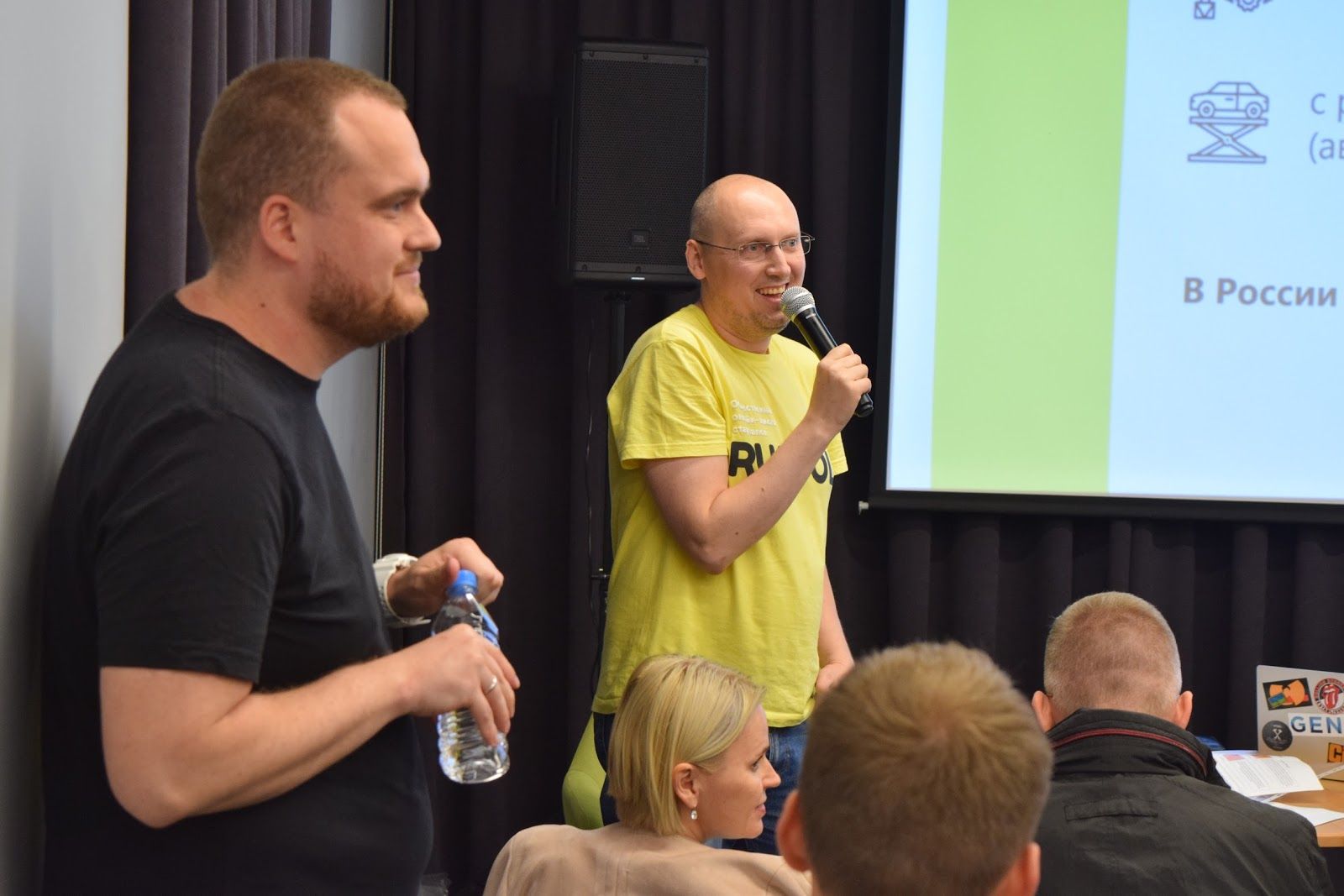
“It was profitable, more than paid in Russia and Ukraine. Since I translated not only AdWords, but everything related to webmasters, I was very good at SEO. I knew how sites are untwisted, what factors work, which do not. So I was able to promote the site for the right keywords. It brought income, but did not bring moral pleasure. My whole life was spent online, and I really lacked live communication. "
For many years, Yuri was engaged in uninteresting work and put all his energy into completely different activities. In 2011, with the money raised and with the help of relatives, he bought an apartment in a house under construction and was very afraid of deception by developers. “I created an online chess - a register of residents and buyers. A person could register in it, note that this is his apartment, and other buyers could see it. I constantly came to the construction site, watched how everything was being done there, talked with people. Chess has also evolved, as well as my communication with people. ”
At first it was a table in Excel. Therefore, a forum appeared, because Yuri already had experience in creating them. Then Yuri began to gradually automate the system. People could use it to calculate a communal apartment or the cost of repairs. Inside it appeared mini-media. And finally, it turned into a tool with which tenants united and solved social problems.
“When the management company raised tariffs or did not fulfill obligations,
it was very difficult to gather people to defend their interests. Organizing everyone online was easier. We integrated the system with the prosecutor's office. A lawyer from among the owners wrote a statement, and if a resident wanted to sign it, his chess data was automatically pulled in one click. A statement was generated and automatically sent to the administration, prosecutor's office or court. It worked amazingly. So we were able to completely repair the road, conduct bus routes, do a bunch of different things. Naturally, no one appreciated our work, well, that's fine.
Once we ourselves organized and held a festival inside a residential complex. At the end, people said: “Thank you very much to the developer for such a cool event.” After the 14th year, I abandoned the whole thing. ”
However, a similar story became the main occupation of Yuri. He developed a system for working with tenants for another private management company and is still engaged in its support. The craving for communication and community gathering resulted in other activities.
Free startup school
Yuri began to organize small meetings in Khimki to communicate with people and learn something new for himself. They were called - “Startup Khimki”. In 2017, when the Y Combinator school was launched, Yuri and his acquaintances translated into her video lectures. They translated 16 lectures into Russian and watched them at meetings. But watching them, Yuri realized that the experience of entrepreneurs from the Valley is not always suitable for our conditions, if you just copy it. Therefore, he decided to organize a similar school in Russia.
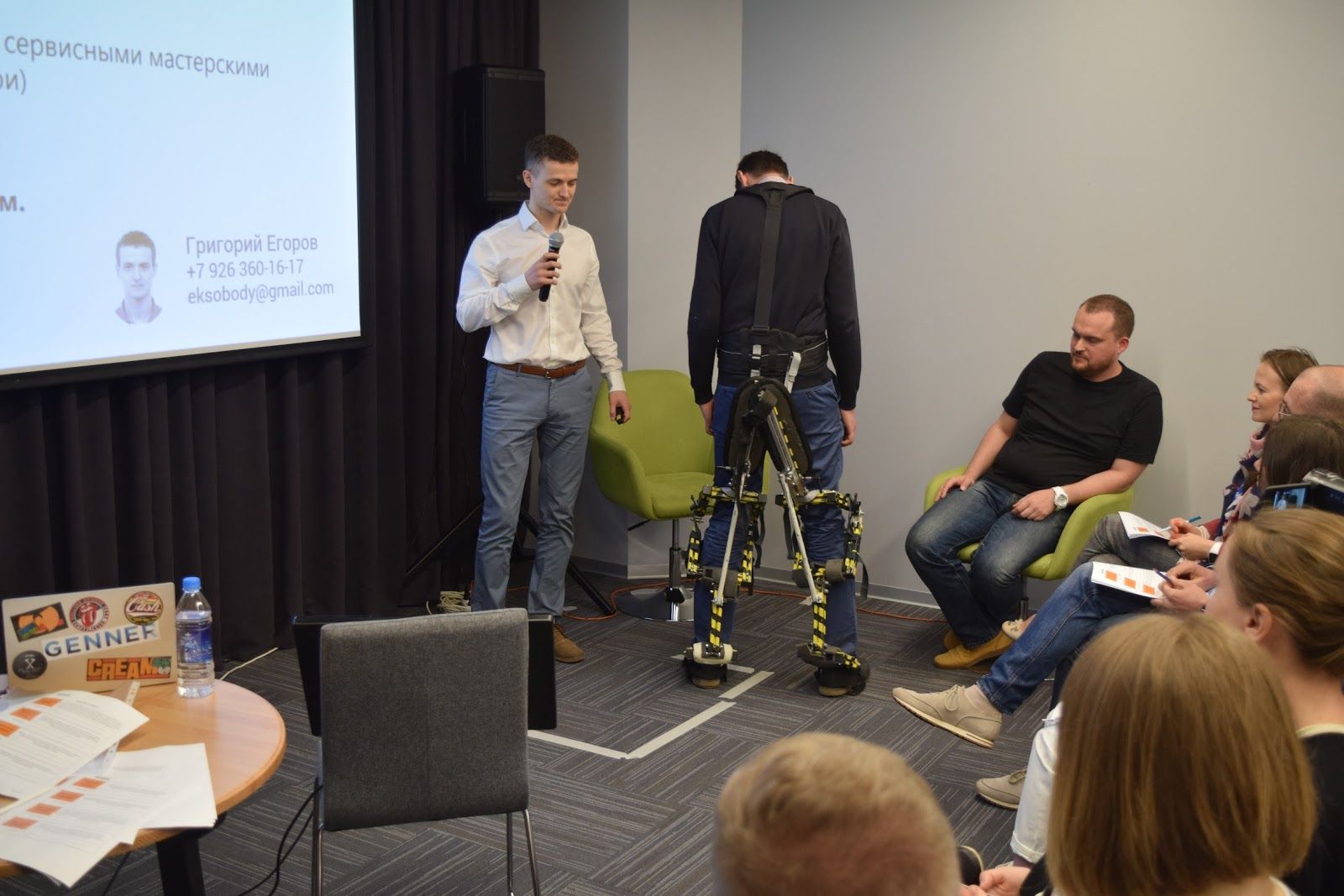
Graduate of spring school enrollment tells investors about the benefits of exoskeleton
In the fall of 2017, he organized the first set of school participants and a series of lectures. He invited people to speak who he would like to hear. The first cycle included Alexander Galitsky, a scientist, entrepreneur and investor, founder of Almaz Capital holding; founder of Elementaree Olga Zinovieva; and Vladimir Shahidzhanyan, who invented “Solo on the Keyboard” - he shared his experience on how to start a startup when you are over 60.
“Some of the people I knew personally. For example, I met Galitsky in California at a conference, and a few years later wrote to him: “Listen, I'm doing such and such a thing, do you want to join? I will be grateful if you tell about your experience. " And he agreed. You need to communicate with as many people as possible, and understand them in order to find a thread for them. Of course, there were failures, but in the first set almost everyone agreed. ”
The main feature of the school was that it was completely free.
“At that moment it seemed to me that this was correct. 95% of startups die. You will take money from them, earn, but will the paid money bring value to them? I think knowledge should be carried free of charge. There are people who think that free is worthless. It seemed to me that I could convince them due to the stardom of the speakers. And people began to wait that at some point I would start demanding money from them. Therefore, I openly said - we are a voluntary association of people, we have a little free time that we spend on the development of society, because we just want to. "
Yuri is well acquainted with economic models for which such initiatives exist. For example, Y Combinator takes a stake in a future company. MIT University has an endowment supported by successful graduates. But while Yuri is not going to monetize the school even in this way.
The program at the school lasts two months and is divided into two parts. The first is a series of lectures, from the idea of a product to attracting investment and public relations. The second part is something like an accelerator, working with mentors on your idea. Of course, eminent lecturers would not be able to pay free attention to someone’s startup idea for two months. Mentors were friends of Yuri. One was Anton Trantin, founder of the Yorso Seafood Exchange. Anton is a graduate of the Y Combinator school, which successfully completed last year's Sberbank 500 startups program.
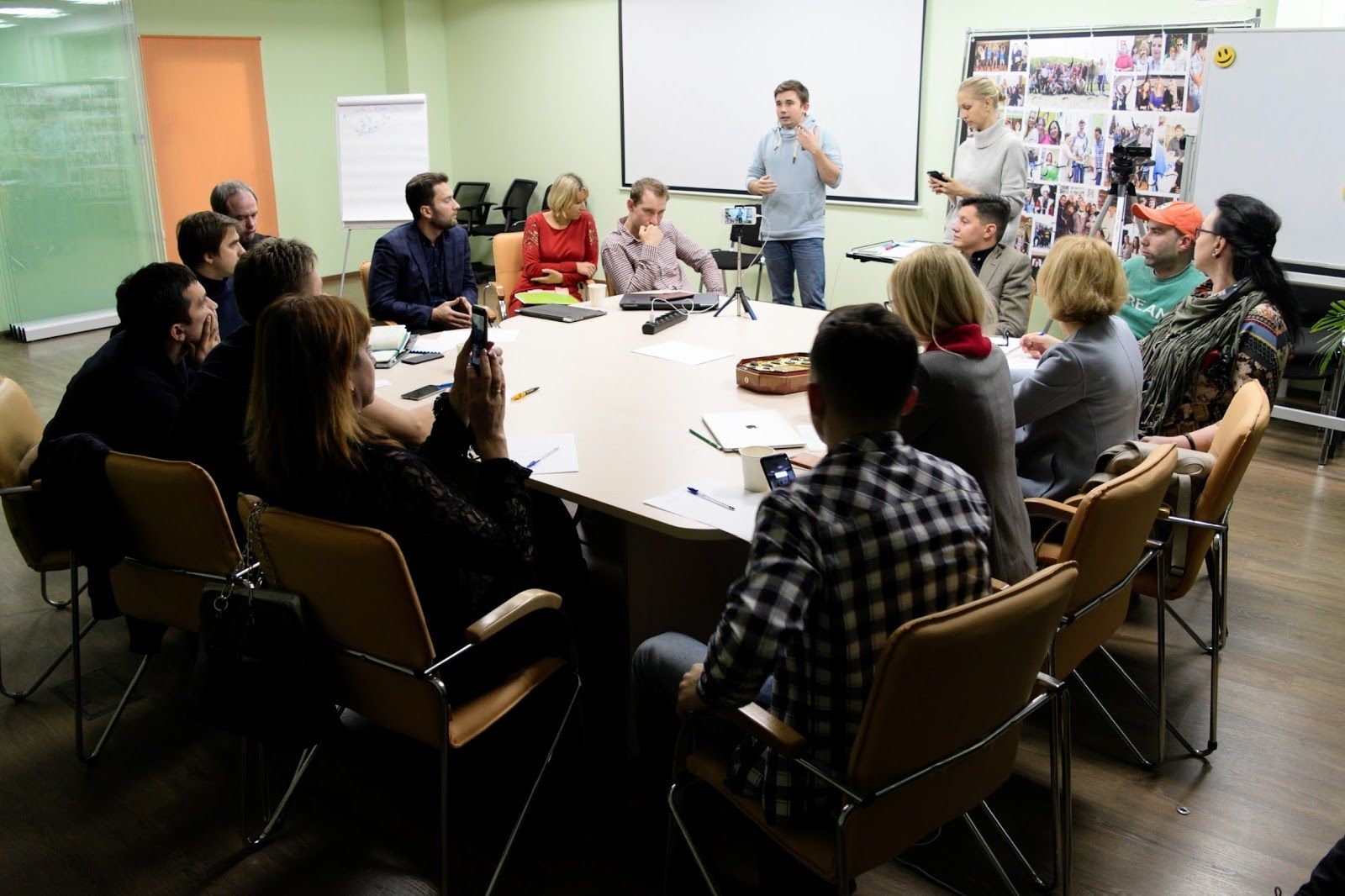
RUSSOL at Expert Hours
“The school model is simply the dissemination of knowledge. The more people gain knowledge, the higher the chances of the next Mask appearing. Everyone is looking for talent. Y Combinator is looking for his Bezos, and we are also looking. Because this is a man who was able to create 560 thousand jobs in 20 years. Our goal is to create 100 thousand technological entrepreneurs. Let them automate at least shawarma, tire service installation or baking, let them have revenues of several thousand dollars a month, but these will be jobs. Ten Bezos in the post-Soviet space can create 5-6 million jobs, and each employee dependent on the conditional 2-3 people. “So many people can depend on the impetus we give to our startups.”
The first admission to school took place according to very informal criteria. Yuri with the team just watched the applications and called those who liked. Then they introduced video pitches. “Some began to send their advertisements, or records of some obscure old interviews for twenty minutes. They were eliminated immediately. Then we introduced interviews, and now we are interviewing all people. In the next set, we also introduce testing. By the way, we will apply the test that Vkusville uses when applying for a job. This test was developed for them by our graduate. "
“We had startups from America, from New Zealand, from Australia, from Austria. We are for all people who understand the Russian language, and we do not care about politics. If a person from Yakutsk or Sterlitamak wants to do something, we will help him with all our might. Indeed, a lot of people cannot even afford to go to Moscow for acceleration. ”
This year, Yuri conducts an experiment with crowdfunding and collects money to translate 20 lectures of Y Combinator school. In the first week, he collected about 60 thousand out of 350.
A logical question: but people who want to create a startup must know English, why do they need to translate something?
Yuri believes that this opinion is erroneous. “Firstly, a lot of people say that they know English, but in fact they don’t know. To understand this lecture, they need to spend much more time and resources. Many, having watched one lecture, are inspired and think that the others will watch, but fall off due to complexity.
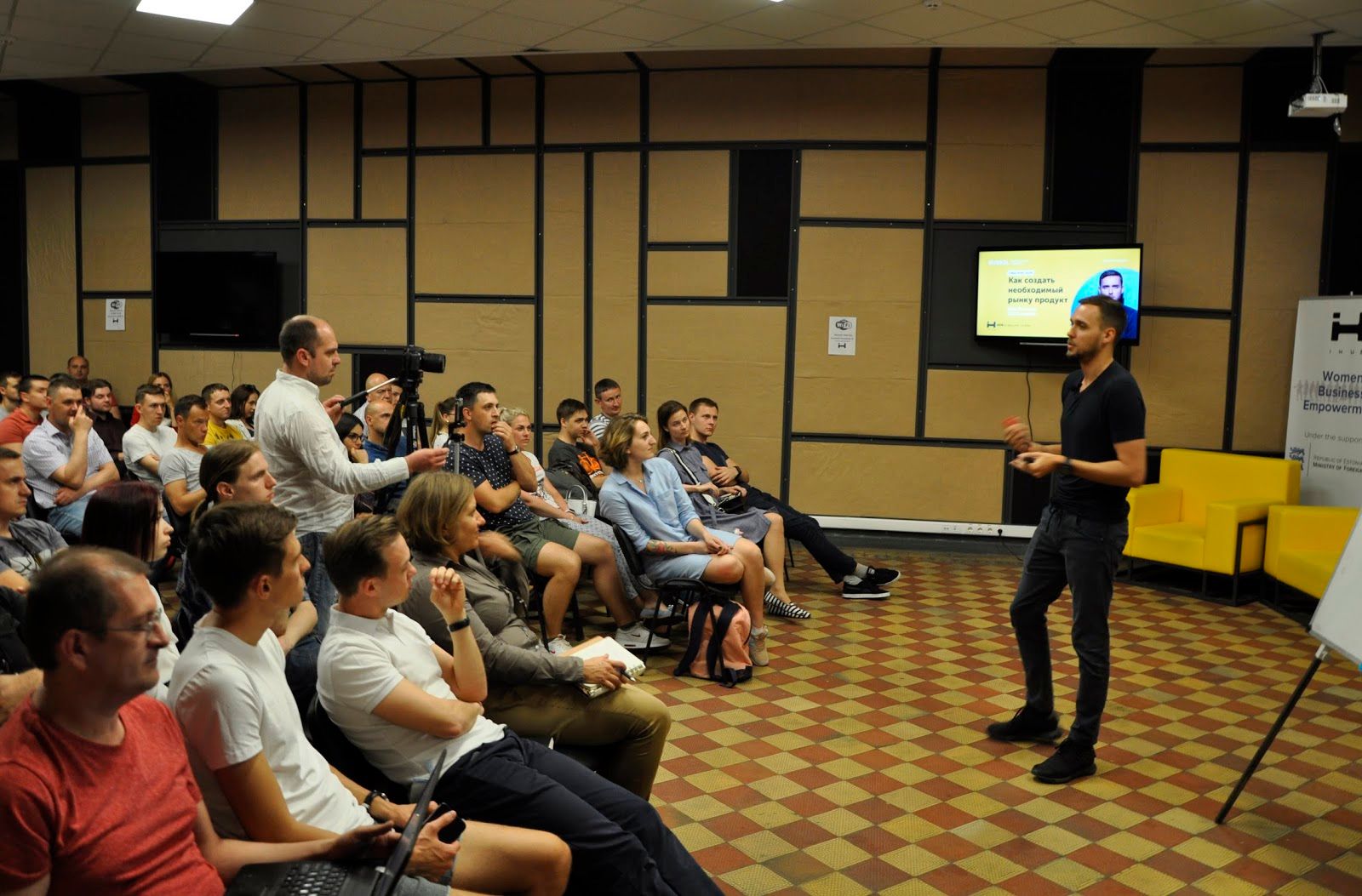
Vlad Tislenko, founder of Concepter (Ukraine), talks about how to create a popular product
Secondly, we do not only give lectures for Moscow, where, conditionally, the best of the best come. We are for people to whom this knowledge may not be available. They are all located in the regions. We held several events in Saratov, Penza, Kiev, and our lectures are much more interesting there. Moscow in some sense snickered, but in the regions there is a demand for it, and they read with pleasure. Thanks to one of these events, in the same Saratov, two people met and are now doing their joint project. These lectures are an occasion to communicate and unite. ”
RUSSOL in numbers
- 100+ lectures at various levels: from design ideas and prototypes to international sales and investments.
- 75+ speaker tops: IKEA Rus, AlmazCapital, Modulbank, YouDo and others.
- 5700+ listeners: entrepreneurs, developers, designers, students.
- 1000+ pages of Y Combinator lectures translated, for 50+ videos there are Russian-language subtitles.
- 20+ mentors from various fields working with startups regularly.
- 15 cities of presence in 4 countries: Kiev, Astana, Chisinau, Yakutsk, Sterlitamak and others.
- 30+ partner sites: Team, DiTelegrah, Flacon, REU Plekhanova, #tceh, MTPP, iHUB and others.
- 4 startup sections at conferences: Secon in Penza, Yukon in Saratov, IPQuorum in Kaliningrad, Rush in St. Petersburg.
- 150+ team volunteers: translators, experts, designers.
- 4 startups received grants and investments for 4.2 million ₽.
- 4 startups are collaborating with SkyEng, Vkusville, Foxford and rb.ru.
useful links
- Video, presentations and lecture notes: Autumn 2017 , Summer 2018 , Autumn 2018 .
- Translations of lectures by Y Combinator with the participation of the creators of Quora, MixPanel and Slack:
If you insufferably wanted to participate
RUSSOL has a Google form for those who want to help with something . The school is always looking for:
- partners for school residents (cloud services, infrastructure);
- experts and mentors for working with selected startups;
- sponsors of school tracks for pilots with startups;
- investors in alumni and equivalent funds YC, 500S, AngelPad, Techstars;
- a site for school headquarters and events;
- support ruble crowdfunding for the translation of lectures.
You can contact Yuri directly: events@russol.info .
All Articles